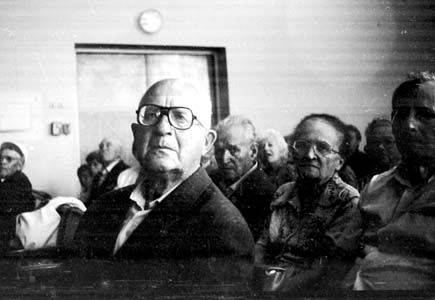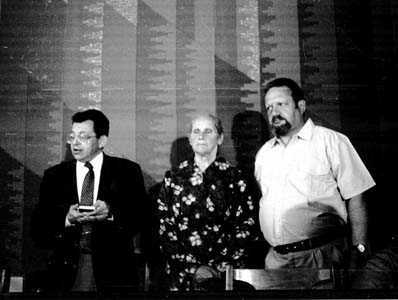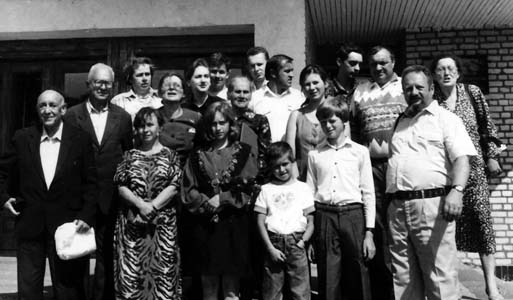

Project «Voices of Jewish settlements. Vitebsk region.»פיתוח קשרי התרבות בין העמים של ישראל ובלרוס
|
|---|
Website search |
|
MainNew publicationsContactsSite mapVitebsk regionMogilev regionMinsk regionMemories of Joseph SosnovikArkady Shulman
|
Story told by Joseph Simkhovich SosnovikWhen the war started I lived in Glubokoye. My wife Yekha Abramovna Pliskina was expecting a baby. On the third day of the war we made a decision to evacuate together with the local authorities of the town. I worked as a teacher and my wife was an obstetrician; we were in no way connected to the authorities but we had common goals. We got to Krulevshizna, where my parents lived. I was planning to take them with us. They refused to join but my brother Nema did. Mania also went with us to Ziabki. She worked as a junior nurse in a pharmacy – a Russian girl who played a vital role in the fate of my family. At the time she was about 19, a girl from a very poor family. Her last name was Kazachenok.  Joseph Sosnovik.
Joseph Sosnovik.
When we drove out of Krulevshizna we observed how Germans were bombing it. It was horrible. My mother, uncle and his wife were killed in that bombing, only father survived. We came to Ziabki and from there moved on to the east with a group of young Jewish people. On the way we were stopped by some authority representatives. They asked: - Where are you from? - From Glubokoye. - Your town is not occupied and you are alarmists. Come back or we will shoot. There is an order to shoot alarmists. We sat down for discussions and decided to wait for half a day. Then in the evening we saw these same men in their car coming back. This time they did not talk to us. We realized things were really going wrong and decided to continue moving westward. After about ten kilometers we saw a small German tank. It was somewhere near Bacheikovo. We tried to break through but the bridge in Beshenkovichi had been exploded. Germans were everywhere, so we made a decision to turn back. We stopped near Ziabki in a house, whose owner gave us food and hid us. The following day we went to Ziabki to see what was happening. Before the war about 20 Jewish families had lived in Ziabki. Nobody had the time to evacuate. The fascists killed three Jews on the first day. I am not sure why, maybe just to scare everyone, or maybe there was an order, but in a few other villages that they had invaded, they also killed three Jews on the first day. That was the case in Ziabki, Prozorki and Germanovichi. And then there was a pogrom. The local population took part in that, too. They did not do any harm to the people, just took everything from the Jewish houses. They even took out window glass.  Israeli embassador Eli Valk, Maria Kazachenok,
Israeli embassador Eli Valk, Maria Kazachenok,the Righteous among the Nations, and Yakov Sosnovik. As soon as the pogrom was over we came back to Ziabki. What else was there left to do? We had to live somehow. We stayed with my wife’s parents in Ziabki. Her father and brother, like all the other men, were forced to do physical work. They decided to hide me for a while, since I was a new person and we did not know how the Nazis would react. And, as it turned out, we did not worry in vain. Once they caught me and sent me with the rest of the Jews to work. And someone reported that I had been seen talking to military commissioners, which meant I was one, too. So, the Nazis took me and several other men to the railway, where they made us dig a hole. We decided that it would be our grave. Meanwhile the Nazis were drinking vodka. Then they bashed us up, they seemed to dislike me especially. After that we were made to carry heavy rails back and forth. All the time the Nazis were leaving to get more and more alcohol. Berka Fridman, a huge guy, who was with us, said: - They will kill us anyway. Let’s pick the right moment, knock them down and try to escape. Maybe someone will be lucky. Exactly at that time a train, which was going by, stopped. A grey-haired general got off and became indignant when he saw the drunken soldiers. He began shouting at them and they lost their interest in us. We were saved. When I got home and was examined by my wife, she told me my nose and arm were broken. I realized perfectly well that if I did not get killed on that day, they would definitely do it the following day. That night my wife and I went to a place, 10 km away, where an acquaintance of ours lived. He first hid us and then took us to Germanovichi, where we used to live before the war. Berka Fridman stayed in Ziabki. The following day he was sent for and beaten almost to death. He nearly died. Then the whole family was sent to a ghetto in Prozorki. There he lost his wife and his three children. He was saved by a miracle. All of Ziabki Jews perished in that ghetto, including my father-in-law Abram Pliskin, mother-in-law Mariasha Pliskina, their daughter Elia and their newborn granddaughter. Elia was a beautiful woman. One of the men, involved in the executions, told Elia: - Leave your kid, I will save you. Elia refused. All the Jews from Yazno, a small village between Disna and Prozorki, were also killed in Prosorki. There were 6 families. Prozorki used to have more than 40 Jewish families before the war. Before the execution all the prisoners were made to undress and then shot. A ghetto was also established in Germanovichi. The Germans picked several most rundown houses on the outskirts and brought there almost 50 Jewish families. The ghetto was not guarded. Since my father was a pharmacist, and it was a “needed” qualification, they let him stay at home and work. Soon the Germanovichi ghetto was liquidated and all the Jews were sent to Sharkovshina. We stayed in Germanovichi. In the summer of 1942 the prisoners from the Sharkovshina ghetto were executed. Many Jews managed to escape during the execution and hid in the nearby forests. They often contacted us – the only Jews who survived. We sent them clothes, bread, medicine. We also informed relatives about how they could find each other. We gave shelter to as many people as we could.  The Sosnovik family and Maria Kazachenok.
The Sosnovik family and Maria Kazachenok.
In the autumn of 1942 the fascists told us that they did not need so many people to work in the pharmacy. So where ordered to move to the ghetto in Glubokoye. We understood what was going to happen to the ghetto and decided to hide. My father went to Glubokoye and agreed with the Judenrat there that they would report to the Germans about our arrival. Then he came back. We were given a horse carriage and a carrier, named Vysotsky. We agreed with him that he would take us to the forest and let us go. Then he would spend the whole day in the woods and come back as if nothing happened. He kept his word. As we found out later, even Vysotsky’s wife was unaware of that. My father used to be a local deputy (when the territory belonged to Poland). According to the law, one deputy had to be Jewish and my father was elected for that post. Both Belarusians and Poles liked him. So, he went to the former head of the region Romeiko, a Pole, and told him the whole story. Romeiko went to a village called Slobodka and there agreed with Mania, the abovementioned Belarusian girl, that she would hide our son. Mania met us in the forest and took the child. My son was born in Germanovichi on August 11th, 1941. Jews were not allowed to go to hospitals at that time but owing to my friends, especially doctor Gerasimovich, my wife gave birth in a hospital. The boy was born with a defect – his urinary tract was too narrow and the doctor had to make an incision. People started gossiping that the doctor performed “the Jewish operation” on the boy. We had to immediately take the boy from the hospital fearing that this information would reach the Nazis. My wife’s parents were extremely religious people and they insisted on circumcision. So, we had it done and my elder son was given a name - Khone-Yankef. Maria and the child lived with Romeiko and she told everyone that it was an illegitimate child and that his father had died in the war. The boy’s name was Yanek. Soon he called her “mom”. Mania always had to make sure the boy had his pants on so that nobody could see he had been circumcised. Every time we suspected there was any kind of threat, we sent Mania and the boy to another place. In places like Pogostie, Germanovichi, Gadutishki, Plisa and Luzhki, Jews were still working in the pharmacies, in some places – on the mills. The Germans did not murder those, who they needed to work for them. In the winter of 1942 – 1943 all the remaining Jews were gathered and shot. This is how my brother and uncle died. However, one could initially understand this was going to happen because a few months before the execution a Polish man was sent to the pharmacy to study. We told uncle Khonia he should leave but he didn’t… In 1943 detachments of the 4th Belarusian partisan brigade came to our forests. There were around 70 people and they joined the Jews who were living in the swampy part of the forest. The Jewish families had been living there from the beginning of the war. They lived in dug-out shelters and were armed. Sometimes they would buy food and sometimes rob villages. They usually picked villages 30-40 kilometers away so that the locals would not revenge. In the winter of 1944 my wife and I went to search for a partisan brigade. We were lucky and soon my wife, and later my father were partisan medical workers and I became a propagandist. Our son, Khona-Yankef, Yanek, Yakov Sosnovik survived. Many people saved his life, but we are mostly grateful to Maria Kazachenok. |
|||
|
|
Jewish settlements in Vitebsk regionVitebsk • Albrehtovo • Babinovichi • Baran • Bayevo • Begoml • Beshenkovichi • Bocheikovo • Bogushevsk • Borkovichi • Braslav • Bychiha • Chashniki • Disna • Dobromysli • Dokshitsy • Druya • Dubrovno • Glubokoye • Gorodok • Kamen • Kohanovo • Kolyshki • Kopys • Krasnopolie • Kublichi • Lepel • Liady • Liozno • Lukoml • Luzhki • Lyntupy • Miory • Obol • Oboltsy • Orsha • Osintorf • Ostrovno • Parafianovo • Plissa • Polotsk • Prozorki • Senno • Sharkovshina • Shumilino • Sirotino • Slaveni• Smolyany • Surazh • Tolochin • Ulla • Verhnedvinsk • Vidzy • Volyntsy • Yanovichi • Yezerishe • Zhary • Ziabki • |
Main |
New publications |
Contacts |
Site map |
Vitebsk region |
Mogilev region |
Minsk region |